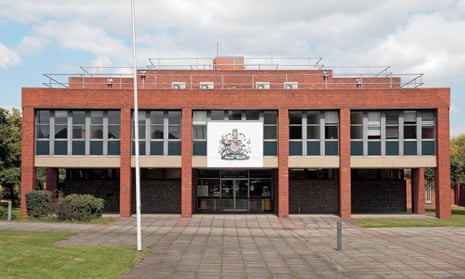Local justice will be destroyed and public confidence in the legal system damaged under plans to switch more criminal trials to video links and centralise proceedings, magistrates have warned.
In a leaked response to the senior judiciary, magistrates in Kent signalled their concern over government proposals to close more courts and rely increasingly on digital technology.
The critical comments are contained in the formal response of the east Kent bench to a consultation exercise, Judicial Ways of Working, launched last year by senior judges. The east Kent bench covers Canterbury, Dover, Folkestone and Margate and has more than 100 members.
The consultation (pdf) sought comments about the likely impact of changes to criminal, civil and family courts as well as tribunals. The £1bn modernisation programme being implemented by HM Courts and Tribunals Service (HMCTS) will involve more remote video hearings, online pleas for minor offences, video replay facilities for jurors in their retiring rooms, and fewer physical courtrooms.
Since 2010, more than 250 courts in England and Wales have closed, due to falling crime rates and technological advances supposedly rendering them redundant. The latest closures included East Berkshire magistrates court in the prime minister’s constituency of Maidenhead.
The comments from magistrates in east Kent highlight fears that local justice is disappearing, partially due to courts shutting and partially because of the single justice procedure (SJP).
Introduced in 2016, the SJP allows low-level offences, such as motoring cases or fare evasion, from anywhere in England and Wales to be tried by a single magistrate solely based on the case papers.
The east Kent bench response said SJP cases come from “a national stack with courts picking up work from anywhere in the country. Currently they are dealt with on a local geographical basis at a local court. This will destroy local justice.”
Proposals to abolish local justice areas in order to increase flexibility in the deployment of magistrates were also attacked. “Magistrates are volunteers,” the east Kent bench said. “HMCTS and [the Ministry of Justice] should not assume they are willing to travel increased distances out of area ... Magistrates in Kent already face between three and four hours return travelling time” to get from home from some courts.
Participation in local communities and close working relationships “will be lost with the abolition of local justice areas which we expect to lead to an increased incidence of resignations,” the magistrates said.
Increased use of video links is proving contentious. The judiciary’s own consultation observed that “judgecraft” could be adversely affected, since early testing had identified “risks of unconscious bias and depersonalisation” in decision-making where defendants were not physically present.
The east Kent bench response said: “Fully video hearings must not be used for contested hearings. Court hearings should be required when a defendant is given a community order, prison sentence or disqualified from driving.”
The magistrates also called for proceedings in youth cases to be held in court as well as ensuring that the defendant is physically present where “there is an identifiable victim who has suffered material loss or injury (including all domestic abuse cases) ...”
Open justice and transparency cannot be achieved by video and telephone hearings if the public cannot observe what is happening, the response said. “Without direct public accountability, there will be loss of public confidence in the rule of law.”
The danger of “off-screen coaching”, where defendants receive inappropriate advice while giving evidence, can only be eliminated if a court official or police officer is present, theeast Kent bench suggested. Methods must be improved for lawyers to consult clients in private via video links ahead of a hearing.
Penelope Gibbs, the director of Transform Justice, which monitors magistrates courts, said: “Grassroots magistrates are clearly very unhappy with the digital court reform programme, both the changes proposed and the way they have been consulted. Magistrates fear the programme heralds the end of local justice – that they will be travelling ever greater distances to court and expected to make judgments on offences which happened hundreds of miles away.
“These magistrates are totally opposed to hearing trials by Skype, with no one in the courtroom and all involved on separate screens in their office or home. They are rightly concerned that video hearings cannot replicate the ‘holistic effect’ of the courtroom. Our own research also suggested that, due to unconscious bias, video hearings may result in harsher sentences.”
A spokesman for the judiciary said: “The Judicial Ways of Working documents were provided to judicial office holders in courts and tribunals by each head of jurisdiction.
“Contributions were received from, or on behalf of, more than 10,000 judicial office holders. As the next part of the process, the heads of division in the courts and the chamber and tribunal presidents in the tribunals have been working to develop jurisdictional views, taking into account these responses and the views of the respective judicial engagement groups. The judiciary and HMCTS will together develop further details of the various reform projects.”
In a blog published in July, Kevin Sadler, the deputy chief executive of HMCTS, said: “The use of video links is now a well-established feature of our justice system – and, as the technology improves, we must be ready to take further advantage of it, in the interests of all those who use our courts and tribunals.
“Giving courts the option of using fully video hearings, where appropriate, has real potential to open justice up further, save time and expense for all those taking part, and enable vulnerable witnesses to give evidence confidently and safely.”
